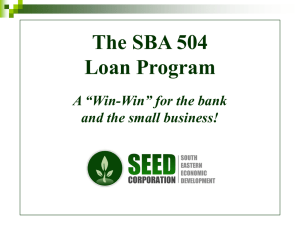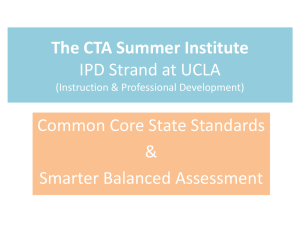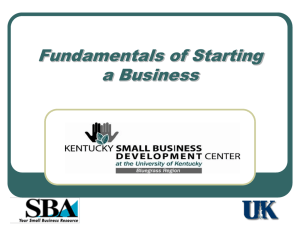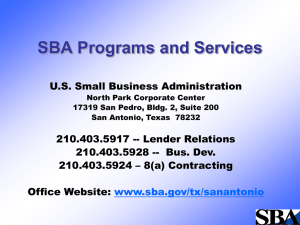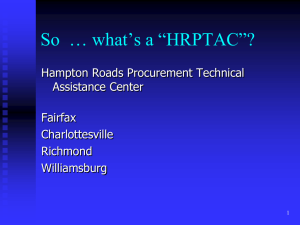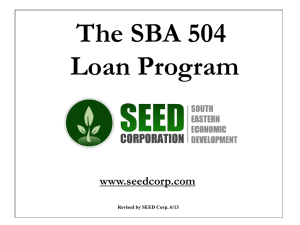SEED SBA 504 Powerpoint
advertisement
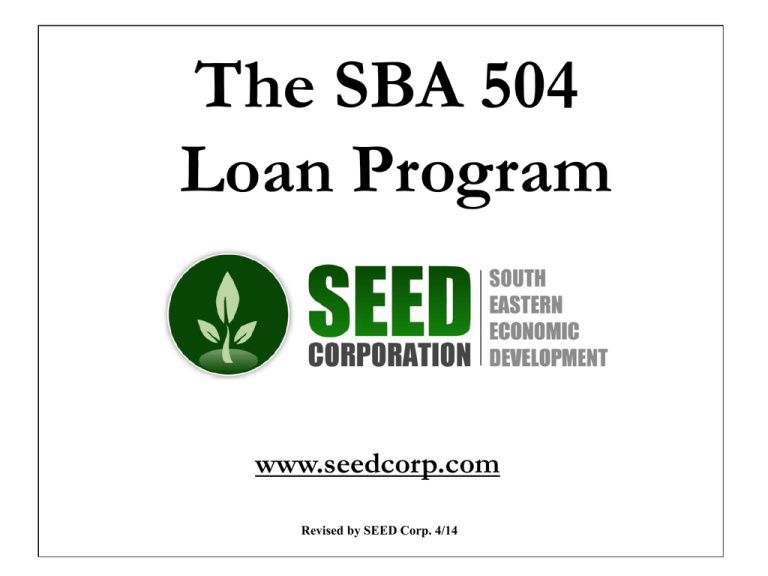
The SBA 504 Loan Program www.seedcorp.com Revised by SEED Corp. 4/14 What is the SBA 504 Loan Program? It is the Small Business Administration’s “economic development financing program.” Loans are provided to expanding, small businesses to aid in job creation. SBA loans are guaranteed by the Federal Government. 2 Goal of Presentation General understanding of the SBA 504 Loan Program from origination to servicing, and 504 Program Features & Benefits Visit: www.sba.gov/for-lenders For Forms, Regulations and Standard Operating Procedure Manuals 3 The Role of SEED Corporation The SBA 504 Program is administered through SBA Certified Development Companies (CDC’s) like SEED Corporation. SEED underwrites, packages, closes and services SBA 504 loans. 4 Selling the 504 Option If the answer to any of the following questions is yes, then give the customer an introduction to SBA 504. Is working capital important to the success of the business? Is a long-term fixed rate important for cash flow? Is a low down payment important? Does the business want protection in the event of a devaluation of real estate? 5 Benefits to the Borrower Up to 90% financing for a fixed asset project. Long-term, fixed rate funds … enhancing cash flow for business. The SEED effective rate as of 3/14 is 5.3% on a 20-yr debenture, and 4% on a 10-yr debenture. Ability to include soft costs, equipment and furniture and fixtures. . .enabling business to minimize out of pocket expenses and preserve cash. Lower down payment conserves working capital. 6 Benefits to the Bank Bank’s maximum loan-to-value is typically 50%, minimizing risk and improving liquidity. Ability to finance projects with as little as 10% injection. Program allows reliance on financial projections for startups and businesses with inadequate historic cash flow. The bank’s first mortgage can be sold in the secondary market for a premium. The CDC is responsible for all of the paperwork! 7 What’s needed for SEED to approve a 504 request? Purchase & sales agreement for project property and cost estimate for construction/renovation projects. Three years of tax returns and financial statements for the business. Information on the borrower’s existing debt. 8 What’s needed for SEED to approve a 504 request? Current personal financial statement and 2 years of personal tax returns for each principal of the business (20% or more ownership). Property appraisal and environmental assessment can be submitted to SEED after approval. No Application Form is required! We essentially use the same underwriting documentation as the bank! 9 Use of Funds Fixed-Asset Acquisition or Expansion: Purchase land & construction of new buildings. Purchase and/or renovate existing buildings. Construct an addition to an existing building. Refinance existing eligible fixed asset debt up to 50% of new expansion project; including an existing SBA 504 loan Acquire/install machinery & equipment. Construct or remodel buildings on leased land. Soft costs related to the project (appraisal, environmental assessment, interim interest, and professional fees). 10 Use of Funds (Cont.) Ineligible use of funds: Debt refinancing(if there are no expansion funds) Purchase of trucks, autos and airplanes Working Capital Franchise fees Management fees and advertising Incorporation / organization costs Contact SEED at (508) 822-1020 for Loan Structure! 11 Project Size Requirements Minimum Amount of 504 Loan: $25,000* There is no maximum limit to project size. Maximum Amount of 504 Loan: Up to $5 million for most businesses Up to $5.5 million for manufacturers and projects generating renewable energy or fuels. * SEED Calculates costs and benefits for 504 projects under $300,000 and may use other program funds. 12 Job Requirements Provide one job for every $65,000 funded (SBA 504 Portion) Exceptions: Manufacturing businesses provide one job for every $100,000 funded (SBA 504 portion). Projects that meet any of the SBA Public Policy Goals or Community Development Goals. 13 Public Policy Goals Not Required to Create one job for each $65,000 Revitalizing a business district of a community (a written revitalization/redevelopment plan). Expanding exports. Expanding minority-owned, woman-owned or veteran-owned businesses. Aiding rural development. Energy-consumption reduction of at least 10% or sustainable design or equipment and process upgrades. 14 Public Policy Goals (Cont.) Not Required to Create one job for each $65,000 Increasing productivity and competitiveness (retooling, robotics, modernization, competition with imports). Modernizing or upgrading facilities to meet health, safety, and environmental requirements. Assisting businesses in, or moving to, areas affected by Federal budget reductions (base closings within 10 years). 15 Community Development Goals Not Required to Create one job for each $65,000 Improving, diversifying or stabilizing the economy of the locality. Stimulating other business development. Bringing new income into the community. Assisting manufacturing firms. Assisting businesses in Labor Surplus Areas as defined by the Department of Labor. 16 Not Eligible for 504 Funding Non Profits Lending institutions Life Insurance companies Private clubs Speculative investment Non-owner occupied building Gambling concerns Businesses engaged in promoting religion Cooperatives (exception for some producer coops) 17 Not Eligible for 504 Funding (Cont.) Political or lobbying services. Businesses located in foreign country or owned by a non-resident alien. Businesses selling through pyramid plans. Businesses engaged in sales or services of a prurient sexual nature. Businesses with prior loss to the government. Relocation of a small business causing a net deduction of one third or more of its workforce or a substantial increase in area unemployment. 18 Typical Structure for Established Business 19 Typical Structure for a Special Purpose Building OR Start-Up 20 Typical Structure for Start-Up Business AND Special Purpose Building 21 Structure of a Typical $1 Million Project Entity Loan Amount % of Project Lender $500,000 50% 1st Mortgage SEED/SBA 504 $400,000 * 40% 2nd Mortgage Borrower $100,000 10%** TOTAL: $1,000,000 Security 100% *Total Debenture: $411,000 ($400 back to client) (Up front fees include 2.65% on $400,000) **Projects that involve a new business and/or special purpose building will require additional 5-10% from the borrower. 22 Eligible Project Costs: Land Construction Contingency(10%) Site Preparation Machinery/Equipment Furniture/Fixtures $ 200,000 600,000 60,000 10,000 50,000 20,000 Soft Costs ~ Permits Architect/Engineer Appraisal Environmental Report Title Insurance Interim Interest & Fee TOTAL 50% Bank 40% CDC 10% Owner 100% $500,000 $400,000 $100,000 $1,000,000 2,500 25,000 4,000 2,500 1,000 25,000 $1,000,000 23 Fees Charged by CDC Financed as part of 504 loan – 2.65% of net debenture CDC Processing Fee (SEED): 1.50% Underwriting Fee: 0.40% Covers expense of pooling & underwriting 504 debenture – paid directly to Merrill Lynch. Funding Fee: 0.25% Paid to Central Servicing Agent (Wells Fargo). SBA Guaranty Fee: 0.50% Total: 2.65% 24 Program Requirements Occupancy Existing Building: Business must occupy at least 51%. - may lease out up to 49% Newly Constructed Building: - Business must initially occupy at least 60%. - Must occupy up to 80% within 10 years. 25 Ownership of Building By the Operating Company (OC). By an Eligible Passive Company (EPC) Individuals New corporation Partnership Limited liability corporation Trust Ownership need not be identical 26 Guarantees Required for any principal with 20% ownership or more in Operating Company (OC) or Eligible Passive Company (EPC). 27 Size Standards* Business – when combined with affiliates must: Have less than $15 million in tangible net worth. Have less than $5 million in net income after taxes (average for last 2 yrs) ~ or ~ Use 7A size standards as an alternative. There is no limitation on annual sales volume * Size standards are increased by 25% in labor surplus areas. 28 Appraisals SBA requires a real estate appraisal if the estimated value of the project is greater than $250,000; All appraisals must be addressed to both the Bank and the U.S. SBA and be consistent with Uniform Standards of Professional Appraisal Practice (USPAP). Be performed by a state certified or state licensed appraiser and for all loans over $1,000,000, the appraiser must be state certified. 29 Appraisals (Cont.) New construction or substantial renovations must estimate “as complete” value and a recertification must be done at completion. CDC must obtain a statement from appraiser indicating the project was built with only minor deviations from plan. If a going concern value is requested due to special purpose nature of the building, appraiser must allocate separate values to the individual components (land, building, equipment and business). When collateral is special purpose, the appraiser must be experienced in the particular industry 30 Appraisals (Cont.) An appraisal must be submitted with application if relying on owner’s equity for injection. 31 Environmental Reports Questionnaire Only – If 504 loan amount is up to and including $150,000. No match to an environmentally sensitive industry. Environmental Questionnaire results in no findings. If findings and over $150,000 then, at a minimum Environmental Questionnaire & Records Search with Risk Assessment is necessary. 32 Environmental Reports (Cont.) Environmental Questionnaire & Records Search with Risk Assessment Unlikely there is environmental contamination. Risk Assessment states “Low Risk”. If “Elevated Risk” or “High Risk” ~ Phase I required. 33 Environmental Reports (Cont.) TSA Required (Transactional Screening Analysis) Environmental Professional must conclude that no further investigation is warranted (Reliance Letter required). If opinion warrants further investigation, a Phase I must be obtained. 34 Phase I Environmental Site Assessment (ESA) Results: If “no further investigation warranted”, Phase I report may be submitted to SBA for approval including the SBA Reliance Letter. If report’s conclusion is “further investigation warranted” the CDC must proceed as recommended by the Environmental Professional. SBA will require compliance with all Environmental Professional recommendations. Phase II ESA or Supplemental Reports Required. 35 Phase II Environmental Site Assessment (ESA) Results: If “no further investigation warranted”, Phase II report may be submitted to SBA for approval including the SBA Reliance Letter. If report’s conclusion reveals contamination, the CDC will need to determine if they will proceed with project. CDC will determine whether disbursement is appropriate according to subparagraph G, Pages 323-326 of SBA SOP 50 10 5(E). 36 The 504 “Process” Borrower or the bank submits a loan package to SEED. SEED conducts preliminary review and works with bank and client. The loan request is presented to SEED’s Loan Review Committee (meeting or e-mail). A commitment letter is sent to the borrower with a copy to participating bank. Loan is packaged and forwarded to SBA Central Office in Sacramento, California for issuance of the Authorization. Three day approval process 37 The 504 “Process” SEED is an Abridged Submission Method (ASM) lender, and submits required forms to SBA plus: • Purchase & Sale Agreement • Construction Cost Estimates • Bank Commitment Letter SBA approves “ASM” SBA 504 loans within 3 days assuming all eligibility requirements are met, and the paper work has been filled out properly. Potential process delays: Franchise reviews; 912 criminal clearances; INS (Immigration) confirmations and gasoline jobber agreement reviews. 38 The 504 “Process” Bank closes on permanent loan and bridge loan. SEED/SBA payoff the bank’s bridge loan in 90 days on turnkey projects or after the project is completed (construction & renovation projects). SBA Authorization (commitment) is valid for four years (48 months). 39 Bank’s Permanent First Mortgage Permanent financing must be for at least 10 years – (on a 20-year debenture) with no balloon payments during that time. Interest rate on the bank’s mortgage is set by bank, and can be fixed or float. Bank can charge points. The SBA charges a one-time bank participation fee of 0.5% on the bank’s first mortgage. 40 Interim Loan (Bridge Loan) Used to provide small businesses with financing needed since SBA 504 closing always occurs at least 60 days before the debenture sale. Used to facilitate change of ownership within time frame specified in the P & S Agreement. Used to finance construction and/or improvements to property – if applicable. Bank makes disbursements and supervises construction. 41 Legal Fees Closing costs are financed into the gross debenture & paid to CDC’s closing attorney Legal Fee – Maximum of $2,500 Other Eligible Closing Costs: Title Insurance Recording fees Flood Insurance Filing fees and title searches Surveys 42 What’s New? Eliminating the personal resource test; on April 21, 2014; Eliminating the nine-month rule for the 504 loan program; on April 21, 2014; The industry agency, National Association of Development Companies (NADCO) is working to “rebrand” the 504 Program to REAL 504 (Real Estate Advantage Loans). 43 Loan Rates Debenture Rate Note Rate Effective Rate 44 Debenture Rate Negotiated by Underwriters, DCFC & the U.S. Government Based on current market conditions at the time the debenture is sold. Paid to bond investors on semi-annual basis. 45 Note Rate Rate stated on the note between borrower & CDC. Amount used in calculating monthly payments. Slightly higher than debenture rate as it is paid on a monthly basis rather than semi-annually. 46 Effective Rate Rate the borrower actually pays Note rate (as of 3/14 Sale): 3.263% Plus Fees: Annual Central Servicing Agent Fee CDC Servicing Fee (SEED .875 + SBA .125) SBA Fee Total Fees SEED’s Effective Rate (As of 3/14) 0.100% 1.000% 0.937% 2.037% 5.300% SBA Required Servicing Fee - This fee can go up to 1.5%. CDC’s Servicing Fees vary and impact the client’s effective rate! 47 Simultaneous SBA 504 Closing with Bank Closing Project is turnkey – does not involve construction or setting up of heavy machinery and equipment. Bank and SBA 504 documents are signed at the same time to simplify process for bank and client. A follow up list of items may be needed prior to funding and bank reimbursement. 48 Funding the 504 Loan When SBA Authorization is received – CDC reviews for changes and/or errors. Copies sent to Borrower & Bank with instructions. Bank orders Appraisal & Environmental Review (if not already completed). CDC orders Preliminary Title & UCC searches (if needed). Work begins on obtaining required documents – corporate resolutions, certificates of good standing, etc. 49 Next Step in Funding Process Before a debenture sale date is set: Title must be taken by new owner. Interim loan must be fully disbursed. Construction or remodeling must be complete. Permanent Certificate of Occupancy or Certificate of Completion must be forwarded to CDC. Borrower’s financial statements must be current within 120 days of targeted funding date. 50 Next Step in Funding Process Once Debenture is Sold – Funds are wired to Bank to pay down interim loan. Letter sent to Borrower stating effective loan rate, payment amount & due date of first payment. One week later, final closing letter sent to Borrower with Amortization Schedule & Debenture Note. Please Note: It can take up to 3 months to fund the 504 Debenture once project is completed 51 Events that Can Delay Funding Process Changes in project costs. Lower than expected appraisals. Incomplete or negative environmental investigations. Changes in Borrower’s organizational structure. Adverse financial change in the operating company. Lawsuit, divorce or other legal issues. Certificate of Occupancy. 52 Prepayment First Half of 20 year Debenture Prepayment Estimate Based on March 2014 Funding Year 1 2 3 4 5 6 7 8 9 10 After 10 % 100% 90% 80% 70% 60% 50% 40% 30% 20% 10% 0% % of Principal Outstanding 103.26% 102.94% 102.61% 102.28% 101.96% 101.63% 101.31% 100.98% 100.65% 100.33% 100.00% Prepayment is based on the negotiated rate plus principal in year one and 10% less each year after. 53 Project Profile: 10% Down Pmt (Standard) Personnel Company – Acquisition of Existing Building Purchase of Land & Building Improvements Soft Costs Bank (50%) SBA 504 (40%) Client (10%) $925,000 148,000 27,000 $1,100,000 $550,000 $440,000 $110,000 Client has been in business over two years, and is purchasing a 10,000 sq ft multi-purpose building for expansion (will lease 40%). Collateral Coverage is based on 90% Loan to Value (appraised on “as completed” basis). 54 Project Profile: 15% Down Pmt (New Owner) Purchase of Existing Restaurant (New Owner) Considered new operation: Building Purchase Price Bank (50%) SBA 504 (35%) Client (15%) $1,200,000 600,000 420,000 180,000 Client has historical restaurant experience. Collateral Coverage is 85% Loan to Value. Building must appraise adequately or additional funds are considered goodwill and must be satisfied outside the 504 transaction. 55 Project Profile: 15% Down Pmt (Special Purpose) Acquisition of a Special Purpose Bldg – Gas Station Building Purchase Price Bank (50%) SBA 504 (35%) Client (15%) $675,000 337,500 236,250 101,250 Client is a three year operator of this leased location and wants to purchase this special purpose facility. Collateral Coverage is 85% Loan to Value on a special-purpose building. 56 Project Profile: 20% Down Payment (Special Purpose and New Owner) Start-Up Hotel Purchase of Land Building Construction FF & E Professional Fees Contingencies/Interim Interest Bank (50%) SBA 504 (30%) Client (20%) $1,500,000 5,000,000 950,000 70,000 380,000 $7,900,000 3,950,000 2,370,000 1,580,000 Client is starting up a flag hotel. Collateral Coverage is based on 80% Loan to Value on a start up, single purpose real estate project (includes furniture, fixtures & equipment). 57 Why YOU Should Consider a SEED/SBA 504 Loan Up to 90% financing for fixed asset project. Lower down payment for client. Long-term, fixed rates for 10 or 20 years. SEED provides quick & efficient turn around (SBA approved for Abridged Submission). SEED provides loans up to $200,000 at 5% fixed to replace the down payment. SEED is responsible for all the paperwork. Call (508) 822-1020 or Visit www.seedcorp.com 58
